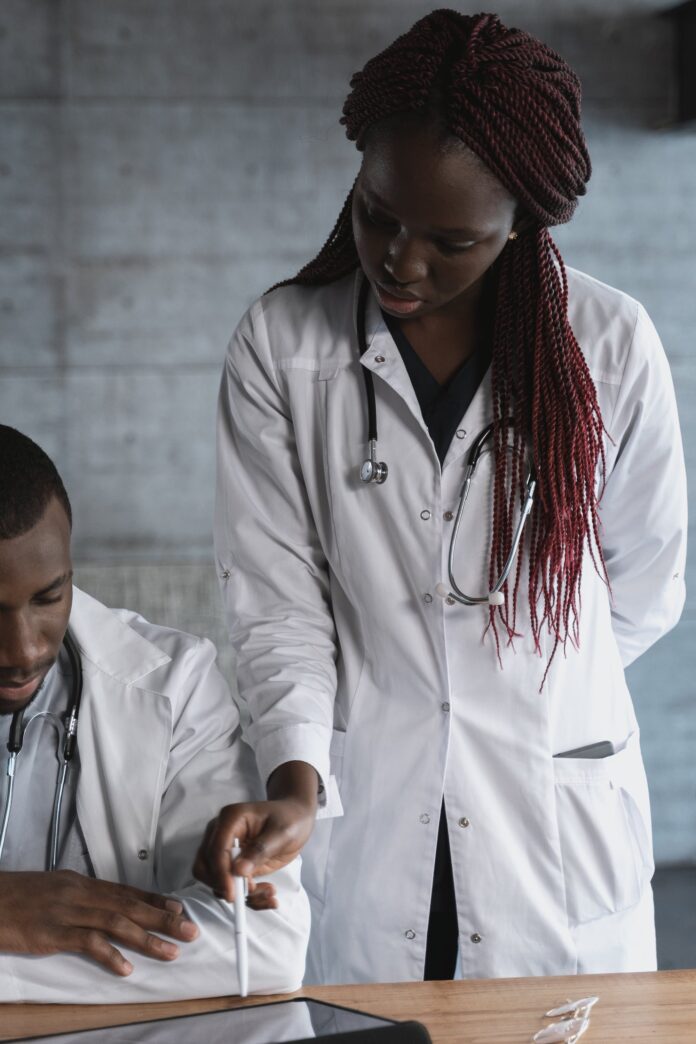
By
The future of our health largely depends on the healthcare leaders and changemakers of today.
Everyone is on their own journey to health and healing. But, at the core of Afrofuturism is the idea to use science, technology, and philosophy to create a better future for Black people. How does that intersect with health?
As Word In Black has vigorously reported, the healthcare system has historically done a lot of harm to our community. And we still experience mistreatment, medical neglect, racial bias, and death. In a Pew Research Center survey of more than 3,500 Black adults, 40% say they’ve had to speak up to get proper medical care.
Despite it feeling like we have the cards stacked against us, there are a number of Black scientists, doctors, and those adjacent to health working to make the future of healthcare better for Black folks.
Here are three.
Joel Bervell, 28, Medical Student

For the last three years, Bervell has used his social media platforms to educate people about the healthcare disparities that Black and brown people face. For example, his content went viral after posting a 30-second video explaining how pulse oximeters are often inaccurate on Black skin because of how melanin absorbs light.
Since then, he started a racial bias and medicine series where he looks at the ways modern medicine still treats people of color differently. “I want this content to be what I wish I’d gotten in my first year of medical school,” he says. Bervell is also attentive to the way he communicates his message, making sure he reaches audiences that are not in medicine.
“My whole goal is to give people that are listening more power in understanding their own health,” he says. “So that when they go to the doctor, they’re not scared.”
Bervell recommends Black and brown people ask lots of questions when they are in a healthcare setting, and provides five tips of how to advocate for themselves.
One of his primary motivations for becoming a doctor is to diversify medicine. Noting, that less than 6% of all physicians in the United States are Black and this has a direct impact on people of color. And, most Black people don’t have a doctor in their family, he says. It’s more than just diversifying medicine but how to disseminate information to communities most impacted.
“My wish is … that people of color and marginalized communities are foremost in medical education,” Bervell says. “And making sure that these narratives are heard and recognized.”
Chidiebere Ibe, 27, Medical illustrator
Ibe became a medical illustrator because he saw a gap in medical education and the health care system that needed to be bridged, he says via email. He’s currently a medical student and medical illustrator at the Harvard Medical School International Center for Genetic Diseases.
In 2021, he illustrated the Black fetus. Many social media users commented that it was the first time they’d seen a fetus that wasn’t white. While some commentators left hateful comments on his work, now he says, most people praise and applaud him for his illustrations.

“It was important for me to represent Black skin in my illustrations because Black people were not represented,” Ibe said. “And this has caused a lot of misdiagnosis or poor treatment of Black people.”
When asked what his vision is for the future of medical illustrations, Ibe says he wants people to be able to pick up a medical textbook and see different races represented properly.
Kizzmekia S. Corbett-Helaire, Virology researcher
Dr. Corbette-Helaire is one of the leading scientists who helped develop the Moderna COVID-19 vaccine. She is a research fellow and the scientific lead for the Coronavirus Vaccines & Immunopathogenesis Team at the National Institutes of Health.
Prior to the pandemic, she spent about five years researching illnesses caused by coronaviruses like SARS and MARS. Due to the existing research Corbette-Helaire already completed, her team played a critical role in the vaccine’s development.
“There are people who I have out-published and out-successed, who are 60 years old and who have the nerve to ask me what I’m going to do next and what’s my expertise,” she told the New York Times in a June 2023 article. “And I’m like, ‘You took my vaccine.’
In the New York Times article, she told reporters she feels the pressure to not fail as a Black woman. And she recognizes the importance of inspiring and standing up for other Black women and girls.
Corbette-Helaire and the many Black scientists and medical students whom she works with are the living embodiment of what Afrofuturism means and needs. In a Pew Research Center survey, Black adults were asked if health outcomes have improved for Black people in the last 20 years. A lot of work is still needed, but 47% say health outcomes have gotten a little or a lot better.
I became a health data reporter because there aren’t enough Black reporters telling our stories. And there certainly aren’t enough health reporters looking at the barriers Black folks face when it comes to healthcare access.
But, beyond the coverage of access, inequities, and the many failings of the healthcare system, we can’t forget to have hope. Our ancestors dreamed of a life of health and wellness. It’s important that we not only continue those dreams but work to carry it out.
What do you imagine as the future of our health?
_____
This story is part of “Black to the Future,” a series that examines how Afrofuturism pushes us to imagine and create a world where people of African descent thrive.


